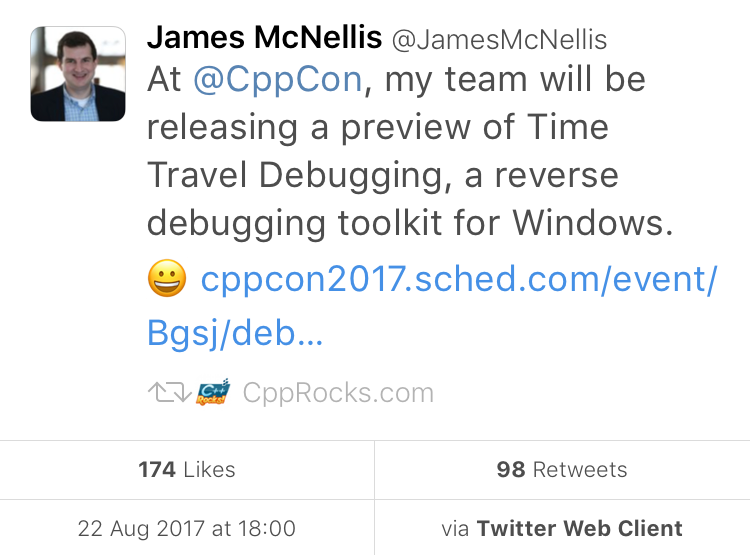Meeting 24 August 2017
C++ Core Guideline Checker in VS2017
- How to enable the checker in VS2017
- How to choose rules
LLVM now supports PDB on Windows
- CodeView format: Microsoft, mid-1980’s, poorly documented
- Linux: DWARF
- PDB = CodeView + database (completely undocumented)
I got some odd stares (to put it lightly) when I suggested that we just ask Microsoft if they would help us out. But ultimately we did, and… they agreed!
Microsoft: cvdump, LLVM: llvm-pdbutil
GCC 7.2 released
- Bugfix release (>95 bugs fixed)
- Changes in GCC 7
Boost 1.65 released
New libraries
- PolyCollection: Fast containers of polymorphic objects
- StackTrace: Gather, store, copy and print backtraces
Outcome v2 is stable
- Reddit post
- Ready for the 2nd Boost review
- Deployed in 2 libs
- Shots fired!
I know those coming from Rust-land feel amazement how long it has taken C++ to replicate Rust’s
Result<T, E>, but I’m very sure ours is enormously superior to theirs already simply by doing so much less because it doesn’t need to. Taking time to get design right is one of the big things which continues to separate C++ from the upstart systems programming languages. Long may it continue!
- You’ll never guess what happened next.
Mutable Lambdas
Object captured in lambda are immutable by default. This is because operator() of the generated functor is const by default.
1auto func = [a]() mutable -> int { ++a; std::cout << a; return a; };
Beware of C++ - Nicolai Josuttis - C++Now 2014 Keynote
We need guidelines on how to use C++ features
noexcept: HH did a test with a move ctor => 10 times faster withnoexcept- Should we have semantics for “strongly encouraged to be
noexcept”? - Issues with constructors, initializer lists and
explicit - Guidelines for
constexpr - The many iterations of
std::make_pair - Guidelines for template parameters
The Speed Game: Automated Trading Systems in C++ - Carl Cook - Meeting C++ 2016
- A few important lines of code
- Millions of market data events per second
- Jitter is a killer
- Latency, not throughput
- No mistakes (or very good recovery)
- Know your hardware
- Don’t try to be an optimizing compiler
- Cache warming
- Bypass the kernel (user-space code, incl. networking - OpenOnload)
- Compile-time dispatch
constexpr- Variadic templates
- Loop unrolling
- Expression short-circuiting
- Branch prediction/reduction
- Avoiding allocations; placement
new - Fast containers
- LTO
Downsides of C++:
- Zero-size vectors may have a cost
std::functionallocates memory- x86 has a stronger memory model than C++11
- you see fewer concurrency bugs, but at a performance cost
- Standard containers and allocators are non-deterministic in runtime cost
Type_safe by Jonathan Müller
- Zero overhead utilities for preventing bugs at compile time (MIT)
- GitHub :: Docs
- C++11
- Header-only
- Reddit thread on constraining parameter values
“At first I loved auto, now I’m just annoyed by it”
- Reddit thread
- Use everywhere or only when it can’t be avoided?
- Use only for iterators, range for loops and lambdas?
- Article
- AAA = Almost Always Auto (Herb Sutter)
- AAAA = Almost Always Avoid Auto (James McNellis, Michael Caisse)
- CRA = Contextually Relevant Auto
Handling std::bad_alloc
Time Travel Debugging is coming to Windows
James McNellis’s announcement for the CppCon 2017 session

Ferret
Ferret is a free software Clojure implementation, it compiles a restricted subset of the Clojure language to self contained ISO C++11 which allows for the use of Clojure in real time embedded control systems.
Generated code is self contained ISO C++11, it is not tied to any one compiler, generated code should be portable between any Operating System and/or Microcontroller that supports a C++11 compliant compiler. It has been verified to run on architectures ranging from embedded systems with as little as 2KB of RAM to general purpose computers running Linux/Mac OS X/Windows.
Here’s a program that sums the first 5 positive numbers.
1(defn positive-numbers
2 ([]
3 (positive-numbers 1))
4 ([n]
5 (cons n (lazy-seq (positive-numbers (inc n))))))
6
7(println (->> (positive-numbers)
8 (take 5)
9 (apply +)))
1$ ./ferret -i lazy-sum.clj
2$ g++ -std=c++11 -pthread lazy-sum.cpp
3$ ./a.out
415
SQLite ORM
- C++14
- Header-only
- The only dependency is
libsqlite3 - Licence: BSD
Overload #140
- The C++ Core Guidelines
- A C++ Developer sees Rustlang for the first time
- Allocator for (Re)Actors